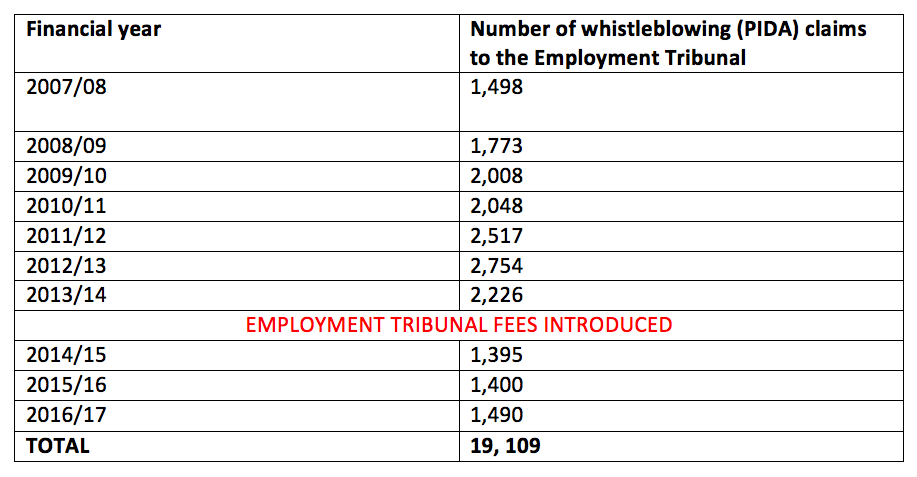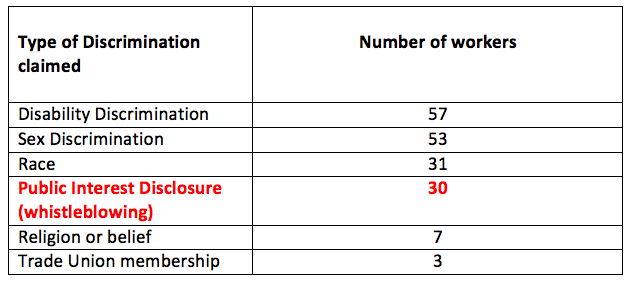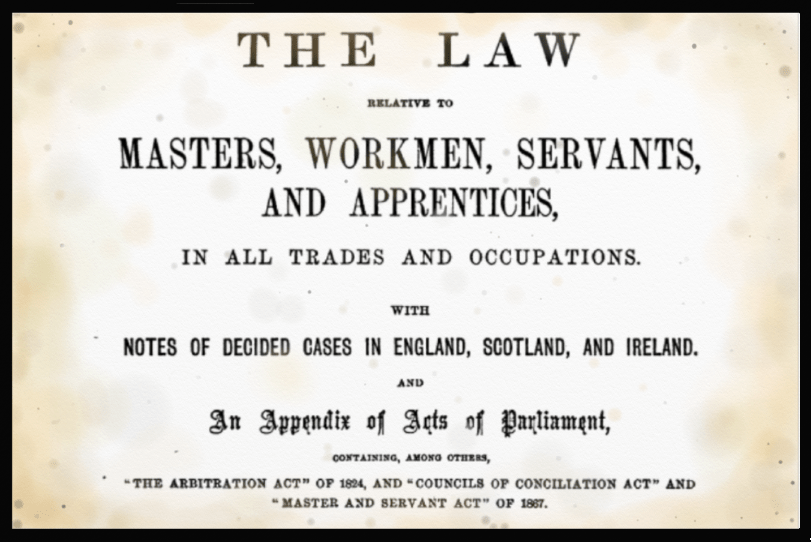By Dr Minh Alexander, NHS whistleblower and former consultant psychiatrist 6 July 2017
From time to time, NHS workforce crises make retention a fashionable issue, as it is now. 1
Because of the established relationship between staff well being and patient care and safety, 2 much lip service is given to NHS staff engagement.
Nevertheless, bullying rates remain high 3 and NHS whistleblowers continue to be sacked. Employers with deep pockets, filled with taxpayers’ money, outgun staff in the courts.
An additional hurdle for staff arose in July 2013 when Employment Tribunal (ET) fees were introduced. A recent analysis revealed that unfair dismissal claims have fallen by three quarters (73%) since ET fees were introduced. 4
Complete data on ET claims against the NHS, and specifically NHS whistleblowing claims, has hitherto been hard to come by as government reports have not given specific stats on sector. They have only given bland data on numbers of cases, heads of claim, and disposal.
Numbers of whistleblowing claims in the last 10 years are as follows:
 Source: Main tables, Tribunal and gender recognitions certificates certificates statistics quarterly: January to March 2017 and 2016 to 2017, https://www.gov.uk/government/statistics/tribunals-and-gender-recognitions-certificates-statistics-quarterly-january-to-march-2017-and-2016-to-2017
Source: Main tables, Tribunal and gender recognitions certificates certificates statistics quarterly: January to March 2017 and 2016 to 2017, https://www.gov.uk/government/statistics/tribunals-and-gender-recognitions-certificates-statistics-quarterly-january-to-march-2017-and-2016-to-2017
I asked ACAS if it kept records on NHS whistleblowing claims but it reported that it only kept data by the broad category of ‘Health and Social Care’:
acas-pida-claims-in-health-and-social-care-foi-2017-006-2-review-alexander
Alongside this, the whistleblowing organisation Public Concern at Work has not revealed exactly how many of its calls come from the NHS – and instead refers to the broader ‘Health’ sector. 5
A series of 100 NHS ET claims collated by employment lawyers previously suggested that unfair dismissal, Race and Disability claims were common, but this was a small group and the method of sampling was unclear.
Since February this year, the government has started publishing ET decisions.
This piece reports this data and is a snap shot of ET decisions about claims against NHS bodies, published between 8 February 2017 and 4 July 2017.
The ET decisions in question were made between 19 August 2016 and 20 June 2017. It is not clear what accounts for the variable gap between decisions being made and published.
This sample shows that not many claims succeed and questions arise about what happens to staff who withdraw their claims.
It also provides some information on recent and current whistleblowing claims.
Longer follow up will be needed for a more meaningful picture.
1.Broad summary
There were 610 Employment Tribunal decisions about the NHS published between 8 February and 4 July 2017, distributed as follows:

There is a small amount of missing data about some cases, but decisions were made by 84 judges and related to at least 673 claimants (671 individuals and 2 organisations). The claimants comprised at least 116 men and at least 543 women.
There were 459 Equal Pay claims, 424 of which were made by women.
Bar 12 cases, the Equal Pay claims all related to the Scottish and Welsh NHS.
Almost all of the Equal Pay claims were struck out because the Claimants made no active efforts to progress their claims, or withdrew them.
A single judge handled all the Scottish Equal Pay claims.
In March 2016, it was reported that 3,000 female Scottish NHS workers would benefit because an Equal Pay claim was settled. 6 It is possible that the above struck out and withdrawn claims are related to this earlier settlement.
2. NHS organisations subject to ET claims
A total of 128 NHS organisations were subject to ET claims.

This is the full supporting data including links to the ET decisions:
This is summary data on the number of ET claims for each of the NHS bodies in question:
Number of ET claims per NHS body
These are the 10 English NHS bodies that received the highest number of ET claims:

3. ET outcomes
The ET decisions related to cases that were at various stages, and not all cases had concluded. In addition to substantive judgments, there were case management decisions and decisions on miscellaneous matters,
Some cases were struck out at an early stage because of flawed claims, or because claimants failed to comply with the ET’s procedural requirements.
Few cases succeeded.
At least 182 claimants withdrew; it is not known how many of these settled.

4. Discrimination
147 NHS workers claimed one or more types of discrimination.
With the exception of 32 Welsh and 3 Scottish NHS workers, most of the claims of discrimination related to the English NHS.

5. Unfair dismissal
There were unfair dismissal claims by 103 workers (4 of which related to Welsh NHS bodies, and 3 to Scottish NHS bodies)
55 of the workers who claimed unfair dismissal contended that they had been subject to one or more forms of discrimination.
Disability discrimination and whistleblowing detriment were most commonly claimed:

6.Upheld claims
All the upheld claims related to the English NHS apart from one Welsh case.
22 ET decisions upheld claims by 32 individuals against 17 NHS trusts and 2 GP practices.
The ET found:
- 11 instances of dismissal to be unfair and one dismissal wrongful.
- 13 instances of failure to pay workers properly (wages, holiday pay, notice pay, redundancy pay and pension contributions)
- 5 instances of breach of the Equal Pay Act
- 2 instances of disability discrimination and one instance of harrassment
This is the list of the 22 NHS bodies which the ET found against:
22 Employment Tribunal decisions upholding or partly upholding claims against NHS bodies
It is important to stress that just because some workers lose their legal cases in the ET, this did not necessarily mean that they did not have a point.
For example, in case 2208141/2016 the ET was moved to point out that although it had no choice but to find in the employer’s favour, it thought that the employer ought to consider its moral duty.
A healthcare assistant who worked for Central and North West London for 14 years, booking shifts as a bank worker, found himself unable to get any further work with the trust after a psychiatric inpatient made serious allegations against him. The ET concluded that he had been very badly treated:
“On 8 June 2016 and thereafter he has found himself blocked from working further shifts, after a patient on the ward, one of three for adults suffering acute stages of mental illness, complained to the police that a member of staff had taken him from the ward to a hotel, raped him, and then brought him back.
This is a serious charge. Nothing in the evidence today suggests that the claimant was responsible. The Claimant says he has never been interviewed about this allegation, either by the police or by the Respondent. It is not said that the Respondent has investigated this allegation. A recent exchange of emails between the police and the Respondent’s solicitors shows that the police are unaware of Claimant’s identity. Nevertheless, the Claimant remains blocked from booking further shifts and so unable to work for the Trust.
…On the particular facts of this case, on the face of it the Claimant has suffered an injustice, because after long and constant hours of hard work for the Respondent, washing and feeding some very challenging patients, he has been left dangling and without work in the face of an allegation by a patient which, while very serious if true, appears not to have taken seriously by either the police or the Respondent. The apparent lack of investigation suggests that neither the police nor the Respondent think the allegation is any more than the fantasy of a mentally disturbed person; if the Respondent has not reached that conclusion, then it is astonishing that they have not investigated a serious breach of its duty to care for the safety of patients, whether looking at the conduct of individual staff members or at their systems of work.”
So, it would appear that this trust is either guilty of a gross Safeguarding failure, or more likely, a gross injustice to a member of staff who has been treated as a disposable commodity.
The claim of unfair dismissal failed in law because there was no employment relationship but the judge commented:
“It is to be hoped that these Reasons will be read by members of the Trust Board, who may conclude that although the Claimant was not their employee, they owe a moral obligation to him, as a long serving, hard- working, and apparently blameless bank worker, regularly undertaking care of very difficult patients at unsocial hours, to check if there is in fact any reason why he cannot be permitted to book shifts and continue working for them. At the very least they should inform him of the progress of the investigation of the allegation leading to his blocking which they are to carry out under the bank worker’s Conduct and Capability procedure.”
7. Whistleblowing (public interest disclosure) claims
30 people claimed whistleblowing detriment against 29 English NHS bodies and 1 Welsh NHS body.
This is the list of cases and NHS bodies involved:
Some Claimants were not allowed to proceed with the whole of their claim, and in three cases, the ET had ordered Claimants to pay a deposit in order to proceed, because it considered that they had little prospect of success.
10 individuals withdrew their claims.
10 cases were not upheld.
The ET concluded in some cases that claimants had made protected disclosures but that this was not the reason for dismissal.
For example, in case 2302743/2015 against Epsom and St Helier NHS Trust, the ET determined that some of the detriments were due to simple management incompetence and not whistleblower discrimation: “lacklustre management…poor management and inertia”, which is scant comfort.
Two cases were partly upheld:
Case No. 1801050/2016 against Rotherham Doncaster and South Humber NHS Foundation Trust : the whistleblowing element failed, and the Claimant succeeded only in proving ordinary unfair dismissal.
Case No. 2300440/2016 against Sussex Community NHS Trust: the whistleblowing element failed, and the claimant only succeeded in proving unrelated unfair dismissal. The ET determined 75% contributory fault by the claimant and ordered that compensation be accordingly reduced.
In two cases, the Claimants were ordered to pay some of the costs to the Respondents.
In a high profile case 2407072/2015 in which a whistleblower had proven unfair dismissal but not succeeded on the whistleblowing element, provisional compensation of £24,441.87
had been agreed without prejudice to a pending appeal by the whistleblower. This is a very modest figure given the real long term losses for Aditya Agrawal, the consultant surgeon in question.
Whilst it is clear that some whistleblowing claims are better founded than others, this data adds to the impression that whistleblowers do not fare well in the current legal system.
There is also a risk that whistleblowers’ concerns are lost in the scrum.
The current legislation is such that the ET barely concerns itself with disclosures, save to establish if they are technically qualifying disclosures that allow whistleblowers to make a claim for post detriment compensation.
Even where the ET may cast aspersions on whistleblowers’ motives for claiming detriment, perhaps with justification, as long as it is established that a worker has made protected disclosures, regulators should take notice of the issues and their potential implication for patients.
NHS regulators and oversight bodies should track both the routine notifications of claims that they receive from the ET at the outset of whistleblowing cases (ET1 forms) and the outcome of cases.
They should follow up on both the specific concerns raised by whistleblowers, and the governance issues arising from such cases.
At present there is no mechanism for NHS regulators to systematically track whistleblowing case outcomes, but there is no longer any excuse now that ET decisions are routinely published.
I have written to NHS Improvement and the other regulators and the National Guardian regarding this, and have asked for sight of any action plan.
There is an argument for regulatory monitoring of the outcome of ET claims in general, as a part of assessing whether or not NHS bodies are well governed and whether the workforce is decently treated.
Specifically, regulators should also look carefully at withdrawn claims and any related settlements, to see how many staff end up gagged.
Lastly, the much derided National Guardian’s Office has confirmed its refusal to review NHS whistleblower cases until Employment Tribunal claims are concluded.
Email 4 July 2017 by the National Guardian’s Case Review manager to a current NHS whistleblower:
“…I can confirm that outstanding decisions relating to a particular case include those to be made by an employment tribunal…Therefore, as you have informed us that you have submitted your case for consideration by an employment tribunal, I can confirm that we are unable to currently consider your case for review.”
Obviously, this can drag things out for years.
So, the “nimble” office that Francis promised us would ensure confidence in speaking up by both preventing reprisal and quickly correcting detriment, proves to be nothing but a tailor’s dummy that stands meekly by whilst whistleblowers get a thorough thrashing.
This is not unexpected but very bad news for patient safety, as is the National Guardian’s refusal to actively pursue whistleblowing law reform, despite expert consensus that this is needed.
Robert Francis should revisit his recommendations given the gap between his promises and the predictably woeful delivery by the DH and its organs.
|
Robert Francis, report of the Freedom To Speak Up Review, 11 February 2015 “97 I believe that the Principles and Actions in this report should together make it safe for people to speak up, and provide redress if injustice does occur. The creation of Freedom to Speak Up Guardians and an Independent National Officer in particular are key components of this, to provide support and ensure the patient safety issue is always addressed.”
|
RELATED ITEMS
1. National Guardian reprieves employers but condemns whistleblowers and patients
2. East Lancashire NHS Trust: Triumph CQC style
https://minhalexander.com/2017/06/14/east-lancashire-hospitals-nhs-trust-triumph-cqc-style/
3. Protecting whistleblowers in the UK. A damning critique of current UK whistleblowing law by Blueprint for free speech, May 2016
Click to access Report-Protecting-Whistleblowers-In-The-UK.pdf

REFERENCES
1 Securing a sustainable NHS workforce for the future, NHS Improvement 29 June 2017
https://improvement.nhs.uk/news-alerts/securing-sustainable-nhs-workforce-future/
2 Understanding staff wellbeing, its impact on patient experience and healthcare quality, Giuseppe Paparella, Picker Institute and Centre for Mental Health June 2015
http://www.picker.org/wp-content/uploads/2015/06/2015-06-10-StaffWellbeingBriefing.pdf
3 In 2016, 24.1% of NHS staff reported bullying and harassment from other staff in the previous twelve months
INSERT
Click to access 20170306_ST16_National%20Briefing_v6.0.pdf
4 Discrimination allowed to “flourish unchecked” as employment tribunal claims fall by 9,000 a month, TUC, 2 November 2016
Unfair dismissal cases slump under tribunal fee system, study shows, Guardian 4 November 2016
5 Time for change, Public Concern at Work, July 2016
Inside Story, Public Concern at Work, May 2013
http://www.pcaw.org.uk/files/Whistleblowing%20%20the%20inside%20story%20FINAL.pdf
6 3000 female workers to benefit as NHS Scotland equal pay claims settled, Herald, 23 March 2016


Why oh why wont CQC disprove your theories Maybe its because they cant Hear no evil See no evil and Speak no evil……….3 (wise?) monkeys
LikeLiked by 1 person
Extraordinarily upset over the ludicrous and shameful treatment of the health care assistant bank worker mentioned in No. 6. How illustrative of the endemic injustice and corrosive incompetence of our institutions.
Thank you for your efforts but I am appalled.
Kindest, Zara.
LikeLiked by 1 person
Hi Zara, I agree the case of the HCA who appears to have been unceremoniously ditched after 14 years service is shocking and sad. I was impressed that the ET went the extra mile to stick up for him. I hope it was not in vain. Best, Minh
LikeLiked by 2 people